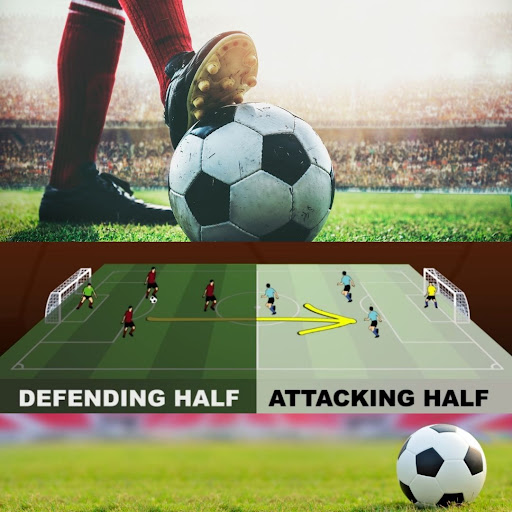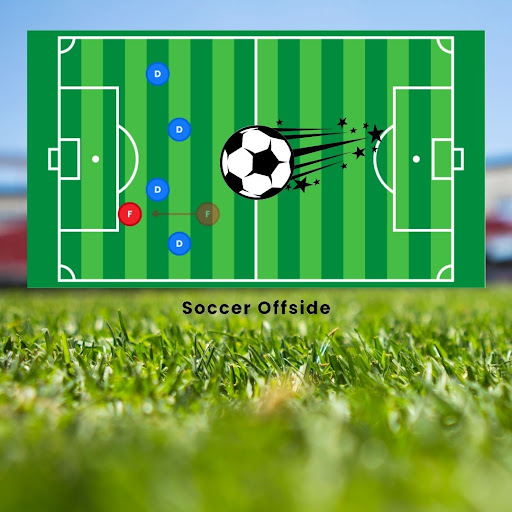The offside rule is one of the more technical aspects of the game, yet it's necessary to make sense of a majority of games in a season.
Without it, we wouldn't be able to understand what goes on when teams get closer than 50 yards from their opponents' goal.
The offside rule was first introduced back in 1883 by the Football Association (FA). The rule was formed to prevent players from consistently creeping around the opposition goal to look for scoring opportunities.
Long balls could be kicked directly toward teammates placed in the opposition goal area without the offside rule. This would demonstrate to be too effective, thereby lowering the component of skill and strategy in football games.
So, what is the offside rule?

|
A player receiving the ball while standing “beyond” the second-last opponent (usually a defender) is considered offside.
The Law 11 of the IFAB Laws of the Game 2022-23 states that:
It is not an offense in itself to be in an offside position.
A player is in an offside position if a part of the head, body or feet is in the opposition’s half (excluding the halfway line) and whatever part of the head, body or feet is closer to the opposition's goal line than both the ball and the second-last opponent.
The offside rule can be confusing and frustrating at times, but I'm going to explain why it's essential in this post.
It is important to note that only the team with possession of the ball can be offside. Also, offsides in soccer can only occur on the attacking side of the field.

|
1. The offside rule prevents teams from simply camping out in front of the opposing team’s goal
Rather than most of the players camping out in front of the opposing team’s goal, they will now be more active throughout the game.
This creates more movement and strategies that need to be enforced in order to have the upper hand.
Instead of just having a boring and non-competitive game, the offside rule will force players to think outside the box.
2. Offsides in soccer allows players to be more creative in their passing
Players will no longer have to wait on one end of the field just to receive the ball and score a goal.
They will now have to come up with ways to outmaneuver their opponents and score from different angles with pinpoint precision.
This does not only apply to players but to coaches as well. It forces them to come up with an offensive play that will not violate the offside rule.
3. The offside rule forces defenders to remain alert and to pay attention to what is going on around them
Now that players on the offensive have to be more mindful of the offside rule, this allows them to create new offensive plays and score differently than usual.
What this means for the defensive side is that they will now have to remain alert and think fast on the fly to counter the opposing team’s plays.
This promotes a healthy way of engagement in soccer because both sides will have to predict and think of several outcomes depending on the play style executed by each side.
4. The offside rule means that the ball cannot simply be kicked up the field, as in rugby.
The offside rule is one of the most important aspects of football. It is responsible for making the game so fast, exciting and unpredictable.
The offside rule means that the ball cannot simply be kicked up the field, as in rugby. The player must be in between two defenders when a pass is made or a kick is taken. If not, then a defender may make a tackle on him without interfering with the play.
5. The offside rule brings defenders into the play, preventing lopsided matches where a team is always on the attack.
The offside rule prevents lopsided matches where a team is always on the attack. It also brings defenders into the play.
Additionally, it also stops teams who are dominating from simply kicking for a goal to get an early lead instead of trying to score more points with their own possession.
Final Thoughts
The offside rule is essential because it prevents teams from scoring too easily.
While the offside rule is simple to learn, it can be difficult to master and take time to understand. It adds another element of complexity, where a simple game could sometimes be viewed as having too little complexity.
But it does that in a way that brings about more fairness in the game, which is truly the goal of any additional rule or regulation.
Many people have argued that the offside rule is outdated and should be abolished.
However, if this rule was abolished it would make football a lot less interesting and the game would lose some core elements which make it so unique from most other sports.
Changing or removing the offside rule, football wouldn't be the same sport that we know and love.







